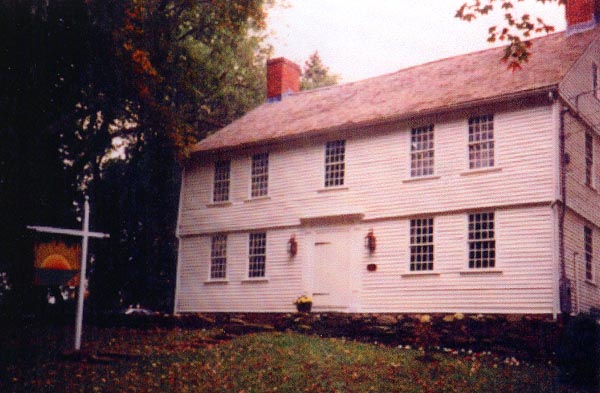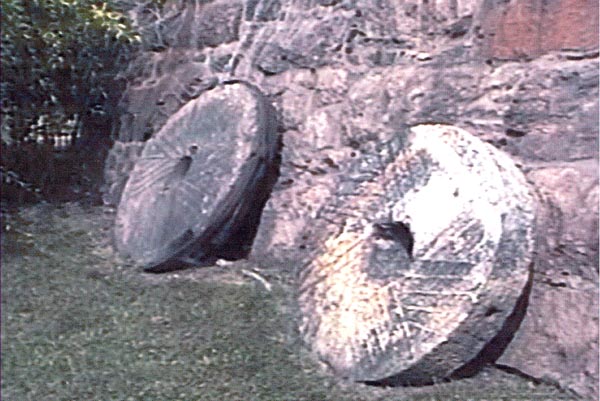
|
Connecticut Todds
First Todd in America -- Christopher Todd
From "The Todd Family in America
Released 14 December 2002
Christopher Todd, was born at Pontefract, West Riding, Yorkshire, England, baptized Jan. 12, 1617, died April 23, 1686, at New Haven, Conn., married Grace, daughter of Michael Middlebrook, of "Hold Mills" Yorkshire, England.
He was barely twenty years of age, when he and his young bride sailed with Mr. Davenports company on the Hector, probably sometime in April 1637. Two months was perhaps, the average time consumed in sailing from London to Boston in vessels of that day. The Hector arrived in Boston on the 26th of June 1637. The immigrants received a warmer welcome than ordinary. The eminence of "the famous Mr. Davenport" and the opulence of the merchants who accompained him, gave to this company, in the estimation of the colonists, an unusual value. Most of the company remained in Boston or the vicinity during the following winter, many of them having found employment suitable to their several vocations. Though somewhat scattered, some finding lodgings and employment in one place and some in another, they were still an organized company.
On the 30th of March, the leader of the company and most of the followers embarked at Boston, having formally decided to fix their plantation at "Quinnipiac" on long Island Sound. After a tedious voyage of "about a fortnight they arrived at their desired port."
It was perhaps, a peculiarity of New Haven, that cellars were used for temporary habitations. They were, as the name suggests, partially under ground and perhaps, in most cases on a hill side. On the Sabbath, they worshipped under an oak tree, near the landing place: and Mr. Davenport, in a sermon on Matthew IV, I, "insisted on the temptation of the wilderness, made such observations, and gave such directions and exhortations, as were pertinent to the present condition of his hearers."
The English, soon after their arrival at Quinnipiac, observed a day of extraordinary humiliation, when they formed a social compact, mutually promising "that as in matters that contain the gathering and ordering of a church, so likewise, in all public offices, which concern civil order, as choice of magistrates, and officers making and repealing of laws, dividing allotments of inheritance, and all things of a like nature," they would all of them be ordered by those rules which the scripture holds forth. For more than a year, they had no other civil or ecclesiastical organization for the transaction of business and, if we may judge of that year by the years that followed, there were penalties inflicted on evil-doers; but if any individuals were authorized to act as magistrates, the record of their appointment has not been discovered.
The plantation covenant, like the compact signed in the cabin of the Mayflower, was a provisional arrangement of men, who finding themselves beyond the actual jurisdiction of any earthly government, attempted to govern themselves according to the law of God. The elective franchise was limited to church members.
At first, Christopher Todd seems to have been one of the less prominent of the colonists. He signed the "General Agreement" modestly, with his mark and quietly took his allotment in the "Yorkshire Quarter," and when the meeting house was "dignified," he had his place assigned him, not in one of the honorable "Middle seats," but in "the third seate on the side," though "Sister Tod"--for they worshipped in those days, "the men apart and their wives apart"--was a little more fortunate, had one of the more honorable "Middle seates." It was not long however, before Christopher Todd began to make another kind of mark. He bought a grist mill, which was the first mill erected by the town of New Haven, "at the falls over the trap dyke at the east end of Mill Rock, two miles from the center of the town." This was at first, hired and then bought of the town, before the year 1686. This mill stood on or near where Whitney's Gun factory now stands and was long known as Todd's mill, and after 1798 passed into the possession of Eli Whitney, who erected there, the first establishment in America for manufacturing fire arms.
The records of the "General Court," show that he was "continually adding to his real estate." He even rose to the dignity of a "Viewer of fences."
In 1650, he bought of Jasper Crane, an acre and a half in the "London Quarter" with the buildings thereon. There he passed the remaining years of his life. This lot, which was on Elm street, between Church and Orange streets remained in the possession of he and his descendants for nearly a hundred years. It was later known as the "Blue Meeting house Lot," on account of the interior of the building, which the "New Lights" erected upon it, being decorated in that color. St. Thomas's Church now stands on a part of it.
Mr. Todd was a farmer, miller and baker and acquired considerable property, some of his land being remote from his residence.
He lived to be a little over sixty-nine years of age, having died in April 1686, leaving a will which is a model for sense and wisdom, and may be seen in the Probate records at New Haven, Ct.
He had three sons and three daughters, the descendants of whom the whole country around and in distant states, has been overspread. Of the sons, John, the eldest and his descendants for a long time continued to till the paternal acres at New Haven. Samuel, the second son succeeded his father in the grist-mill. His descendants have been the most numerous. Michael, the third son also had a large family and many descendants many of whom have been farmers. Mercy, the eldest daughter married John Bassett and became the mother of a large family. Grace, the second daughter seems to have been mentally deficient, and though she married Richard Mattock, was soon deserted by him, and was especially provided for in her father's will as being "incompetent to take care of her self or any estate." Mary, the youngest daughter was married to Isaac, son of Capt. Nathaniel Turner.
Children:
*2. John, bapt. Dec. 2, 1642.
*3. Samuel, bapt. April 20, 1645
*4. Mercy, bapt. Sept. 16, 1647.
5. Grace, bapt. Dec. 15, 1650, married Mar. 2, 1668-69, Richard Mattock. When about thirteen years of age she was called before the court and sentenced to be "whipt for some improprieties of conduct." She seems to have been mentally unsound. Soon after her marriage she was deserted by her husband. Her father, in his will, provided for her as one being "incompetent to take care of herself or any estate."
*6. Michael, b. June 15, 1653.
*7. Mary, b. Feb. 18, 1655.
Capt. Gideon Todd's house/tavern.
Note The Rising Sun tavern sign.
|

|

Millstones lie agaist dam
at Christopher Todd's mill.
|
|
|
|
Capt. Gideon Todd
Gideon Todd II was born in North Haven, Connecticut, Nov. 3, 1737. He died March 22, 1817.
His father was Gideon Todd I (1705-1728), and his grandson was Gideon Todd III (1796-1864).
He married Prudence Tuttle in 1761. Prudence was the daughter of Daniel and Phebe (Beach) Tuttle from Wallingford, Conn., her father being an officer there under the King. Gid was refused the Tuttle's permission to marry their daughter. One winter day he and Prudence eloped to North Haven and were married. Her parents disowned her, but as time passed they forgave their daughter.
Mr. Todd supported the King, when the trouble came about taxation, until the time of the Boston "tea party," when he threw himself and his fortune into the cause of the Colonists.
When the news came of the British invasion of New Haven, Conn., he was in his barn, dressing off an ox, for meat carts were unknown in those days, when a man passed by on horseback, crying "The British have entered New Haven." Jumping on his horse he started at once for Fort Hale.
His plucky wife, Prudence, at once took hold, and helped finish the work of dressing off the creature, with only a boy to assist, loaded the carcass into a cart, and immediately started, in her husbands wake, for Fort Hale, saying, "The soldiers must have meat to give them strength to fight." When the load arrived someone shouted "Three cheers for Captain Todd's wife," and they were given with a will.
Capt. Todd was widely known. His tavern, The Rising Sun, on the Northford turnpike was a famous stopping place for travelers. It was also called The Half Way House between New York and Boston. It is was well preserved and in 1919 was the home of G. Henry Todd.
A Visit to Connecticut by Harold & Darlene Todd, Ashland, NE, 2002
Mill Stones (above photo)
As told to use by the curator of the Eli Whitney Museum in New Haven, Connecticut: Eli Whitney place the stones against the dam when he quit milling flour and changed to a gun factory. The stones were place against the dam to show the Indians flour was no longer milled, as Christopher Todd traded the milling of four to the Indians for land.
Home of Gideon Todd II (above photo)
This is the house Gideon Todd owned and lived in at the time of the Revolutionary War. It is located in North Haven, Conn.
Capt. Todd was widely known, as he took an active interest in civil and educational affairs. His tavern, The Rising Sun, was a famous hostelry, and a favorite stopping place for travelers. It is now the home of his grandson G. Henry Todd, who takes pleasure in showing the old tavern sign, the military hat and vest, sword and other relics of Colonial days.
Also on display are two deeds, given in the Reigns of their Gracious Majesties George II and George III, Kings of England, and a permit for the first carriage ever owned in North Haven, for which luxury Gideon paid a tax.
The wine cellar of the spacious mansion is interesting, as are the wainscoted chambers. The story of the home being haunted adds interest to its charm. During the revolution, when excitement ran high, an enthusiastic patriot exclaimed in the barroom that he would shoot at the sight of a Tory. A poor ignorant slave boy cried, "I'se a Tory. I'se a Tory." The impetuous rebel seized his gun and fired. It has been said that the slave's ghost walks the broad hall at night.
Gideon was captain during the Revolutionary War, and was a man of energy and decision. It is said that he fitted out a privateer, to help the cause, at his own expense for he was a rich man for those days. There are many interesting stories told of the valiant Capt. Todd.
When we visited Gideon's home, the owner was very happy to show the house. It still has the wide, plank flooring, which was worn away except for the knots, which were slick and shiny. The home is kept in near original condition.
|
|